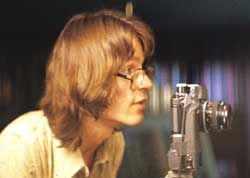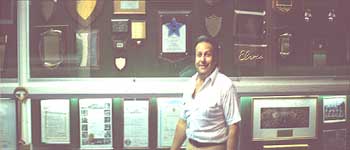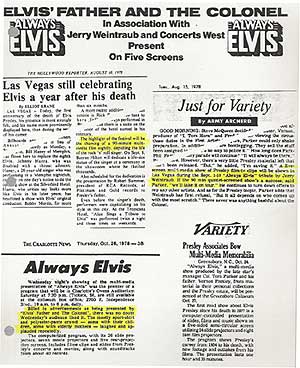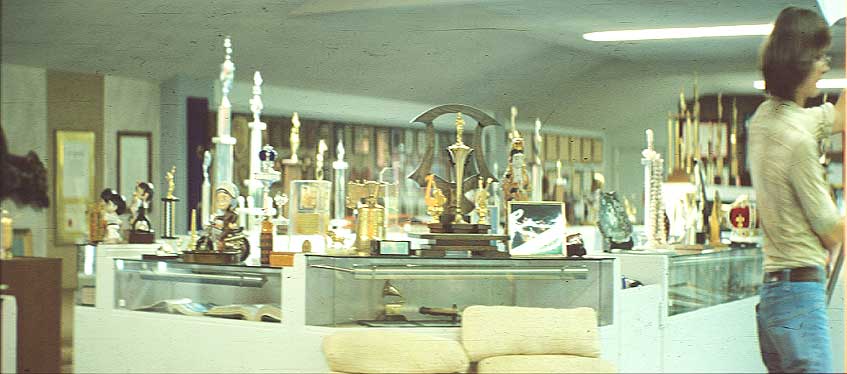DON
WREGE, JOE ESPOSITO AND ALWAYS ELVIS
an
email to Daniel Lombardi that got a little out of hand
by Don Wrege
Copyright © 2007
Photos
copyright
© Peter
Inova and Don Wrege
(click on photos with blue borders for a larger view)
METAVISION - 1978
Soon after I was hired by the Los Angeles multi-media firm Metavision I was called into the conference room to discuss a new and exciting project they had just landed.
 "So, you like rock and roll?" asked president Theo Mayer. "Of
course," I chirped. "Then your timing isn't half bad,"
he said, looking at me a bit too seriously.
"So, you like rock and roll?" asked president Theo Mayer. "Of
course," I chirped. "Then your timing isn't half bad,"
he said, looking at me a bit too seriously.
I had unwittingly signed on for one of the most difficult but satisfying
media production experiences of my life: "Always Elvis" a traveling
multimedia extravaganza featuring 5 side-by-side screens illuminated by
24 slide projectors and eight synchronized film projectors with a full
concert sound system. The show would feature never before seen photos
and footage of Elvis, and be a self-contained "concert," while
providing an audiovisual retrospective of Elvis' life and career. It was
a dream project for me and my bosses knew it.
"Are you a decent photographer?" Creative Director Peter Inova asked me. "You bet!" I told him of my two summers as an apprentice to a large-format photographer in my home town, my basement darkroom when I was in high school and my college film degree. "Well then, you're going to Memphis with me," he said and my heart leapt. Since childhood I had seen photos of Elvis' home Graceland, and it seemed like a miracle that I was going to get to walk through those musical gates and into his private domain. "My timing isn't half-bad," I thought to myself driving home.
ALWAYS
ELVIS
The show was being produced, I found out later, to fulfill
a contract Colonel Parker had with the Las Vegas Hilton. As I understood
it, The Colonel did business by handshake, and he had shaken hands on
a deal to provide  Elvis
as the main attraction for the grand opening of the new Hilton Pavilion
— a massive multipurpose venue where concerts, conventions and prize
fights would be staged. The only problem was that Elvis had passed away.
The Colonel, being a shrewd business man, convinced the Hilton that by
providing the "Always Elvis" multimedia show, he was meeting
the terms of the contract.
Elvis
as the main attraction for the grand opening of the new Hilton Pavilion
— a massive multipurpose venue where concerts, conventions and prize
fights would be staged. The only problem was that Elvis had passed away.
The Colonel, being a shrewd business man, convinced the Hilton that by
providing the "Always Elvis" multimedia show, he was meeting
the terms of the contract.
When this skinny 24 year old kid was introduced to Elvis' Best Friend, Joe Esposito, I didn't know how I was going to be received. Joe immediately put me at ease with his easygoing style and ever-present smile. Esposito treated us all like we were equals on a team. He was so much fun to be around that you just wanted to hang out with him. I never wondered for a moment why he was Elvis' Best Friend - everyone loved Joe. How could you not?
We traveled to Memphis to photograph memorabilia in Elvis' Trophy Room. This was an amazing journey for me and Joe was quite talkative on the long drive from the airport out to where Graceland sits. He told us stories of the Memphis Mafia, explained what the strange monster plant overgrowing the power poles and lines was (kudzu), and we had a meal with his friend "Dr. Nick."
THE
TROPHY ROOM
 |
 |
What struck me first about Elvis' Trophy Room was how much stuff he had kept. Next to items from presidents and kings would be snapshots of someone's family with a little note attached. Elvis obviously treasured both equally. Framed proclamations from dignitaries worldwide hung on the wall. Teddy bears from all over the globe with "We love you Elvis," handwritten on them in various languages. I was overwhelmed with the love represented here. Both ways.
"This whole room was a slot car race track once," Joe mentioned with a faraway look. "Elvis went through a phase...we'd race all night."
At one point, sitting on the floor with our camera copy stand and a stack
of black and white photos, Joe was sifting through the shots and telling
us what each one was and when it was taken. During this process he held
one for a moment, speechless, and it was obvious it had caused him to
choke with emotion. Peter and I left the room quietly and walked around
for awhile, allowing Joe the moment alone. He too had just recently lost
someone he loved very much, and he was obviously hurting.
It gave me time to more closely examine the cases where some of Elvis'
clothes were on display and still more framed proclamations from the globe's
Very Important People. In a far corner, one of them seemed to be moving.
 On
closer inspection, I noticed what must have been termites or some other
little bugs chomping away on the edge of the document in the frame between
the glass. It was creepy, but the muggy humidity of Tennessee breeds all
sorts of life and it had crept into the trophy case.
On
closer inspection, I noticed what must have been termites or some other
little bugs chomping away on the edge of the document in the frame between
the glass. It was creepy, but the muggy humidity of Tennessee breeds all
sorts of life and it had crept into the trophy case.
Joe showed us around the grounds and introduced us to Vernon Presley, who was working in an out building serving as his office. The place was filled with boxes and boxes of letters from the fans expressing sorrow for Elvis' loss. "I'm going to answer every single one," Vernon said. I was really touched by his sincerity and love for the fans. Outside, Lisa Marie zipped by in a golf cart singing, "Love Me Edmund, Love Me True" (Edmund, if I remember correctly, was Lisa-Marie's pet dachshund.)
After we had completed on-site photography and were at the airport preparing to fly out, Joe asked Peter and me for our plane tickets. "Wait here," he said, walking up to the counter. He came back with upgraded first class seats for us all. We returned home triumphant and in style thanks to Joe's generosity. I sipped champagne while Peter took photos of the clouds through the plane's window that ended up being one of the backgrounds for "I Can't Help Falling In Love With You" in the multimedia show.
PRODUCTION
Working on "Always Elvis" was a 24/7 deal for the
hippies at Metavision. We were doing the 24-projector slide show and programming
everything while a contingent of filmmakers worked on the eight 16mm film
portions. The two camps were different mainly by virtue of the drugs we
used to keep working through the nights and weekends. At Metavision we preferred pot, or "combustible motivation,"
as Peter used to call it. The Beverly Hills guys were coke heads. Needless
to say we didn't mix and mingle much or well at all. I found the Beverly
Hills guys to be quite full of themselves.
At Metavision we preferred pot, or "combustible motivation,"
as Peter used to call it. The Beverly Hills guys were coke heads. Needless
to say we didn't mix and mingle much or well at all. I found the Beverly
Hills guys to be quite full of themselves.
Joe, meanwhile, seemed totally uninterested in drugs. "They either make the day go too slow or too fast - I like things the way they are," was his attitude. Joe was the perfect go-between — he got along famously with both camps and was the diplomatic liaison for the course of the project..
We were using bleeding edge technology to synchronize the film projectors with the slide projectors and soundtrack. A European company had a new method for doing this and it was buggy. The evening we tried for the first time to bring the entire 28-projector monstrosity to life was an exciting moment. The whole company gathered, champagne and joints in hand.
Inova hit the button and we held our breath. The opening musical vamp of "Promised Land" pumped through the speakers. I got goose bumps as I watched the screens come alive with my sparkling "Always Elvis" logo animation, the film projectors lurched to life right on schedule and — the power blew out. All of us were stunned, suddenly standing in the dark, only the tiny red tips of the sagging joints could be seen in what was first silence, then uproarious laughter. At least it was a good excuse to go home and get some sleep to give the electricians some time to beef up our power panel before we got back to work the next day.
THE
COLONEL
Once we had the show produced and programmed it was time to
invite Jerry Weintraub and The Colonel to our offices for a review. Of
course we were all very nervous but at the same time intensely proud of
the show we had put together. The memory I cherish the most is of The
Colonel first waving his hands around, then standing, motioning for an
'all stop,' during the song "Teddy Bear."
We spent a long time on that song and I had carefully isolated and animated
various poses from an Elvis photo shoot that, when animated, showed Elvis
dancing in time with the music. Various "cute" shots of Elvis
were splayed across all five screens in rhythm with the music. It was
one of my favorite sections of the one hour and 35-minute show. 
"Where are the teddy bears? Where are the goddam teddy bears!" The Colonel yelled. "Teddy bears?" Peter Inova remarked, horrified at the thought. "I wanna see teddy bears! Lots of em!" With this The Colonel stormed out uninterested in the rest of the presentation. We were shocked. I was terrified that we had pissed him off somehow. Inova was distraught that his carefully designed show was going to be blasphemed with, god forbid, teddy bears.
We sucked it up (literally - the pot, that is) and got to work. Becky, Theo's wife, went on a teddy bear buying spree. We readied the photo studio and began animating the little dolls back and forth so they would "dance." Of course we shot various scenes of the bears doing unspeakably obscene things to one another but these never saw the screen.
Long story short, once we got to Vegas for the premiere, "Teddy Bear" was an audience favorite. My first thought upon hearing the roar of approval — louder for this song than others — was that The Colonel certainly knew his audience and how to please them. Weintraub, on the other hand, didn't seem to have the same respect for the ticket purchasing public. "Put a few more rows of seats down there," we heard him telling the maintenance men in the theater. "But that's too close to the screen, they won't be able to see everything!" Inova protested. "My job is to put asses on seats," Weintraub shouted back, "Put the rows there."
I happened to be checking out of the hotel the same time The Colonel was and witnessed an interesting interchange at the front desk. "What's this, a bill?" The Colonel yelled, seemingly insulted. (He had commanded nearly an entire floor of the hotel throughout the two weeks of show prep and performance.) "I've never paid for a room here in my life." The poor desk clerk made some meek sounds which resulted in The Colonel tossing the bill back across the desk with, "Here — give it to Weintraub."
PROMISED
LAND
 Not
only did the show have a ten day run in Vegas, it packed up and toured
the south. Metavision's Hal Park took the show on the road and as the
reviews reveal, the crowds loved it. As a backhanded compliment that I
very much enjoyed, Saturday Night Live did a skit based on our
show called "Elvis Presley's
Coat," wherein one of Elvis' costumes is attached to a microphone
stand while a stage hand rocks it back and forth from below in time with
Elvis' hit songs. That's when I knew we'd arrived!
Not
only did the show have a ten day run in Vegas, it packed up and toured
the south. Metavision's Hal Park took the show on the road and as the
reviews reveal, the crowds loved it. As a backhanded compliment that I
very much enjoyed, Saturday Night Live did a skit based on our
show called "Elvis Presley's
Coat," wherein one of Elvis' costumes is attached to a microphone
stand while a stage hand rocks it back and forth from below in time with
Elvis' hit songs. That's when I knew we'd arrived!
As part of the "Always Elvis" fan fest, The Colonel would sometimes sit at a card table and sell for a dollar apiece a poem he had composed called, "WRITTEN FOR ALL THE FANS WORLDWIDE." For another dollar he would sign it. I bought one for a memento not really thinking much about it, but reading the poem later something struck me. The way he capitalized "Parents" and "Mom" for example, I felt if there actually was a soft side to The Colonel, this poem revealed it.
Once I got back to my North Hollywood home, trying to put the previous few months of my life into perspective, I kept coming back to that poem and how it represented not only Elvis' career but The Colonel's and the fans' feelings about the man and his work. I got inspired to put some chords behind it, record and send it to The Colonel as a kind of 'thank you.' But as a timid 24 year old kid I lost my nerve and never did.
This was before I learned that it is usually the things you don't do in life that you live to regret.


